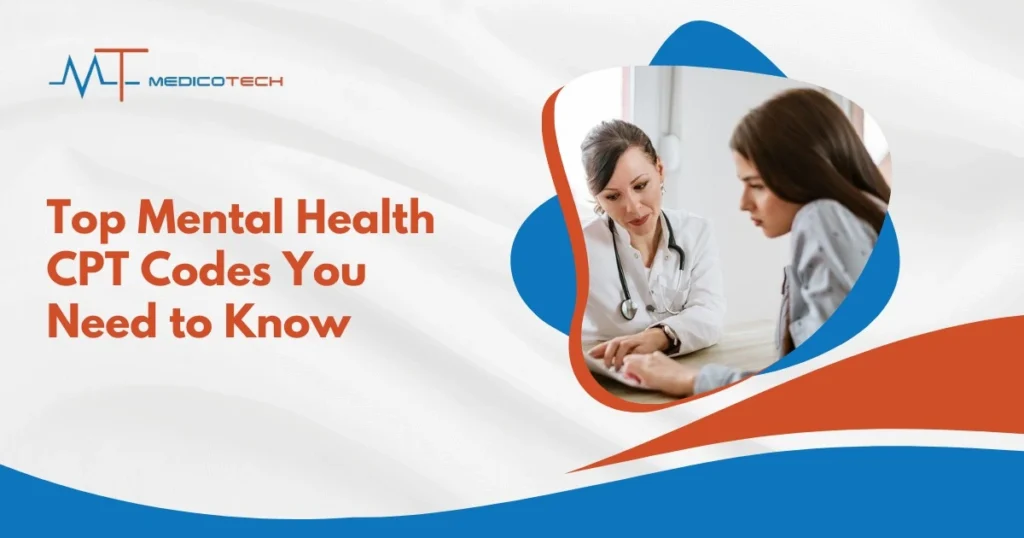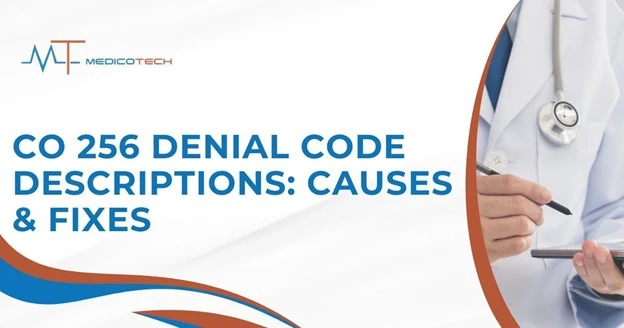When it comes to mental healthcare services, the particular element of the efficiency of the system and the fact of reimbursement is the knowledge of mental health CPT codes. They are the codes established by the American Medical Association (AMA), to standardize documentation and reporting of healthcare services. They are applicable in the sense that they are issued for purposes ranging between diagnostic assessments up to the psychotherapy sessions where the therapists, psychiatrists, and other mental health professionals are able to charge the insurance provider appropriately.
To the mental health practitioner, decoding mental health CPT codes is important not only in terms of reimbursement, but also in ensuring that insurance standards are met. Correct coding will not only reward therapists with adequate payment despite their efforts, but it lowers the chances of claims being rejected and makes the process of billing less time consuming.
Why Are Mental Health CPT Codes Important?
Mental health CPT codes serve several purposes:
- Standardization: These codes standardize the way services are documented across various platforms, from healthcare providers to insurance companies.
- Billing Accuracy: CPT codes ensure mental health professionals are reimbursed fairly and appropriately for their services.
- Compliance: Correct coding is vital for maintaining compliance with federal and state regulations regarding healthcare reimbursement.
For anyone working in mental health, having a clear understanding of these codes is essential to smooth and efficient billing practices.
How CPT Codes Are Organized
CPT codes are organized into different categories based on the type of service provided. The Mental Health CPT codes are found under the “Medicine” section of the CPT manual, which is divided into several subsections. Here’s a breakdown of how these codes are structured:
- Evaluation and Management (E/M) Codes: These are used for general psychiatric assessments and visits. They include initial evaluations, follow-up visits, and consultations.
- Psychiatric Diagnostic Evaluation: These codes cover psychiatric evaluations and diagnoses, often used to assess a patient’s mental health condition.
- Psychotherapy Codes: These codes are for individual, group, and family psychotherapy, where the therapist engages with the patient in a therapeutic session.
- Add-On Codes: These are used in conjunction with the main CPT codes to report additional services, like interactive complexity or crisis therapy.
Each section within the mental health CPT codes focuses on a specific type of service, ensuring that the code used for each interaction is both accurate and appropriate.
Top Mental Health CPT Codes for 2025
| CPT Code | Description | Usage |
| 90791 | Psychiatric Diagnostic Evaluation (without medical services) | Used for initial psychiatric evaluations without medical services. Commonly used for diagnosing mental health conditions like depression, anxiety, or PTSD. |
| 90792 | Psychiatric Diagnostic Evaluation (with medical services) | Similar to 90791 but includes medical services such as prescribing medications or ordering lab tests. Often used by psychiatrists combining psychotherapy and medication management. |
| 90832 | Individual Psychotherapy, 30 minutes | Used for shorter therapy sessions (about 30 minutes), ideal for brief, focused interventions like Cognitive Behavioral Therapy (CBT). |
| 90834 | Individual Psychotherapy, 45 minutes | Commonly used for standard-length therapy sessions, typically around 45 minutes. This is the most frequently billed code for outpatient therapy. |
| 90837 | Individual Psychotherapy, 60 minutes | Used for more intensive therapy sessions lasting 60 minutes, often necessary for patients with complex mental health issues. |
| 90839 | Crisis Psychotherapy | Used for emergency situations involving an acute mental health crisis. Covers the initial 60 minutes, and additional time can be billed using add-on code 90840. |
These mental health CPT codes for 2025 represent the most frequently billed services in the field of mental health, reflecting the growing need for both diagnostic evaluations and therapy sessions.
CPT Codes for Diagnostic Evaluations
Diagnostic evaluations are the foundation of mental health treatment, helping providers assess a patient’s mental health condition and plan a course of action. The most commonly used CPT codes for diagnostic evaluations include:
- 90791 – Psychiatric Diagnostic Evaluation (without medical services)
As mentioned earlier, this code is used for a comprehensive assessment to diagnose mental health conditions. It involves detailed interviews and mental status exams, and it does not include any medical services like medication management.
- 90792 – Psychiatric Diagnostic Evaluation (with medical services)
This code is used when the diagnostic evaluation also includes medical services, such as prescribing medication or conducting laboratory tests to further understand the patient’s condition. It’s most commonly used by psychiatrists.
- 96127 – Brief Emotional/Behavioral Assessment
This code is used when a brief, standardized emotional or behavioral assessment is conducted. It is typically used to screen for conditions such as depression, anxiety, or other common mental health disorders.
Diagnostic evaluations set the stage for the treatment plan, and accurate coding ensures that mental health professionals are compensated for their time and expertise.
Psychotherapy CPT Codes: Duration & Settings
Psychotherapy is one of the most widely used services in mental health, and it involves different CPT codes based on the duration of the session and whether other services are provided simultaneously. Here’s an overview of the psychotherapy CPT codes:
- 90832 – Individual Psychotherapy, 30 minutes
This code is used for individual therapy sessions that last around 30 minutes. It is typically used for brief interventions, focused therapy, or check-in appointments.
- 90834 – Individual Psychotherapy, 45 minutes
A standard session length, 90834 is used for traditional individual therapy. It’s appropriate for addressing a wide range of mental health issues and is commonly used in outpatient settings.
- 90837 – Individual Psychotherapy, 60 minutes
This code is for longer, more intensive sessions lasting an hour. It’s often used for patients with more complex mental health issues that require extended therapy.
- 90853 – Group Psychotherapy
This code is used when therapy is provided to a group of patients simultaneously. Group therapy can be a highly effective treatment method, especially for conditions such as anxiety, depression, and addiction.
- 90846 – Family Psychotherapy (without patient present)
Used when therapy is focused on the family system, without the patient being present. This code is often used when addressing family dynamics that contribute to the patient’s mental health issues.
- 90847 – Family Psychotherapy (with patient present)
This code is for therapy sessions that involve both the patient and their family. It’s essential for treating family-related issues that affect a patient’s mental health, such as conflicts or communication issues.
Understanding the correct psychotherapy CPT codes based on session duration and setting is critical for billing accuracy and proper reimbursement.
Add-On Codes for Mental Health
In the field of mental health CPT codes, add-on codes play a significant role in providing additional billing for services that require more time or additional complexity during a session. These codes are used alongside primary mental health CPT codes to ensure accurate Medical billing services and proper compensation for the full scope of services rendered.
Understanding Add-On Codes
Add-on codes are marked with a “+” symbol in the CPT manual and can only be used in conjunction with a primary code. They are designed to reflect additional services provided during a session, such as extended therapy or specialized techniques. For mental health professionals, knowing when to use these codes is essential for maximizing reimbursement.
Common Add-On Codes in Mental Health
- 90785 – Interactive Complexity:
This add-on code is used when a session becomes more complex due to factors like involving multiple family members or handling sensitive communication dynamics, such as working with children or patients who struggle with communication.
- 90839 – Crisis Psychotherapy:
This code is used for therapy sessions during an acute crisis, typically lasting 60 minutes. If the session extends beyond 60 minutes, 90840 can be added to bill for additional 30-minute increments.
- 90833, 90836, 90838 – Psychotherapy with E/M Services:
These add-on codes are used when psychotherapy is combined with evaluation and management (E/M) services during a single session. The codes vary by the length of the psychotherapy session: 30, 45, and 60 minutes, respectively.
These mental health CPT add-on codes ensure that all aspects of the patient’s care are captured and reimbursed, including extended sessions and additional complexities.
E/M Codes for Mental Health Services
Evaluation and Management (E/M) codes are a crucial part of mental health CPT codes, as they are used for both diagnostic and ongoing management services in a variety of settings. These codes are designed to describe the services provided when a mental health professional assesses, diagnoses, and treats patients.
E/M Codes Overview
E/M codes are used to report non-psychotherapy services, often in combination with psychotherapy services. They are typically used for diagnostic evaluations, consultations, and treatment of more complex cases that require medical management in addition to psychotherapy.
Key E/M Codes for Mental Health:
- 99201-99205 – New Patient, Office or Other Outpatient Services
These codes are used when a mental health professional provides an initial assessment and diagnostic evaluation for a new patient.
- 99211-99215 – Established Patient, Office or Other Outpatient Services
These codes are used for ongoing care provided to established patients. They reflect the level of care required based on history, examination, and decision-making complexity.
- 99217 – Observation Care Discharge
This code is used when discharging a patient from observation care, typically in a hospital setting.
- 99241-99245 – Office or Other Outpatient Consultations
These codes are used when a psychiatrist or other mental health professional provides a consultation at the request of another healthcare provider.
- 99251-99255 – Inpatient Consultations
These codes are used for inpatient psychiatric consultations.
E/M Codes in Mental Health
E/M codes are essential for capturing the medical management aspects of a mental health encounter, especially when treatment includes medication management or complex diagnostic work. They are frequently used in conjunction with psychotherapy codes to accurately report a comprehensive treatment plan.
Using CPT Modifiers in Billing
CPT modifiers are two-digit codes added to a primary CPT code to provide additional information about a service or procedure. For mental health professionals, using these modifiers correctly ensures that services are accurately represented and reimbursed appropriately.
What Are CPT Modifiers?
Modifiers provide context about a service, indicating special circumstances or additional complexity. They help differentiate between routine services and those requiring extra time, effort, or resources.
Commonly Used CPT Modifiers for Mental Health:
- Modifier 25 – Significant, Separately Identifiable E/M Service
This modifier is used when an E/M service is provided separately from another primary service, such as when psychotherapy is billed with an evaluation and management service.
- Modifier 95 – Telehealth Services
Modifier 95 indicates that a service was delivered via telehealth. This has become especially important in recent years with the rise of remote mental health services.
- Modifier 22 – Unusual Procedure Services
This modifier is used when the service requires significantly more effort than usual, such as extended therapy sessions or complex crisis management.
- Modifier 52 – Reduced Services
Modifier 52 is used when a service is reduced in scope or time. This might apply to sessions that are shorter than typical due to unforeseen circumstances.
Using CPT modifiers ensures transparency in billing and helps prevent claim denials due to a lack of clarity about the nature of the service provided.
Mental Health CPT Reimbursement Tips
Navigating mental health CPT codes for reimbursement can be complex, but there are key strategies that mental health professionals can employ to ensure smooth billing and appropriate compensation.
Top Reimbursement Tips for Mental Health Services:
- Ensure Accurate Documentation
Always document the specific services provided during a session, especially for mental health CPT codes that involve complex therapy or additional services like E/M.
- Use the Correct Modifiers
Apply modifiers correctly to clarify any special circumstances that might affect reimbursement. For example, use Modifier 95 when providing telehealth services to ensure coverage under most insurance plans.
- Verify Insurance Coverage
Before billing, confirm that the CPT codes used are covered by the patient’s insurance plan. Some insurance companies have limitations on the number of psychotherapy sessions they will reimburse.
- Understand CPT Code Changes
CPT codes are updated annually, so it’s essential to stay informed about any changes that could impact reimbursement. For instance, new codes may be introduced for emerging treatments or procedures.
- Submit Timely Claims
Submit claims as soon as possible to avoid delays in reimbursement. Timely submission can also help prevent claims from being lost or rejected.
By implementing these strategies, mental health professionals can improve their chances of receiving prompt and accurate reimbursement for services provided.
Medicare & Mental Health CPT Codes
Medicare plays a significant role in mental health services for eligible individuals, but understanding Medicare’s reimbursement policies for mental health CPT codes is critical for mental health providers.
Medicare Coverage for Mental Health Services
Medicare reimburses for a variety of mental health services, including psychotherapy and diagnostic evaluations. However, the reimbursement rates and policies vary, especially for mental health CPT codes used in outpatient settings.
- Psychiatric Diagnostic Evaluations
Medicare generally reimburses for psychiatric evaluations, but it has specific rules regarding the frequency and type of service provided. For example, Medicare typically reimburses one 90791 or 90792 per year for institutionalized patients, with exceptions for medical necessity. - Psychotherapy and E/M Services
Medicare covers psychotherapy services under certain conditions. For psychotherapy codes like 90832, 90834, and 90837, it’s essential that the provider ensures proper documentation to support medical necessity. - Telehealth Services
Medicare has expanded its coverage for telehealth services, which includes mental health CPT codes like 90832 and 90837 for remote therapy sessions. However, providers should check that telehealth services meet the required criteria set by Medicare for reimbursement.
Mental health professionals treating Medicare beneficiaries must be aware of specific guidelines related to mental health CPT codes to ensure proper reimbursement and compliance with Medicare’s rules.
Conclusion: Streamlining Billing
Navigating the complexities of mental health CPT codes can be daunting, but understanding their structure, how they’re used, and how to apply modifiers effectively can streamline the billing process. Accurate coding ensures timely reimbursement and protects mental health professionals from errors that could lead to claim denials.
By staying up to date on the latest CPT code changes, verifying insurance coverage, and adhering to best practices in documentation, mental health providers can ensure they are compensated fairly for the care they provide. Furthermore, applying mental health CPT codes correctly can prevent misunderstandings with insurance companies and create a smooth process for both providers and patients.
Incorporating efficient billing practices into your practice not only enhances revenue flow but also reduces administrative burden, allowing you to focus more on providing quality care to your patients.




